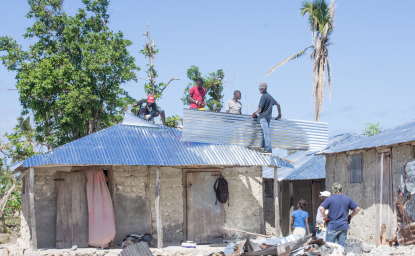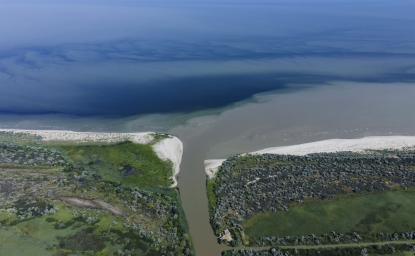World Water Week Draws Water Experts From Around the Globe
AUGUST 2007—Stockholm Conference Attendees Dive Into Governance Challenges, Integrated Ecosystem Services, Effects of Climate Change
AUGUST 2007—Stockholm Conference Attendees Dive Into Governance Challenges, Integrated Ecosystem Services, Effects of Climate Change
More than 2,000 representatives from businesses, governments, and nongovernmental organizations working on water issues gathered in Stockholm this month for the 17th annual World Water Week. This year's theme, "Progress and Prospects on Water: Striving for Sustainability in a Changing World," encompassed everything from climate change's effects on water resources to the role religious groups can play in helping the world meet the Millennium Development Goals. Over the course of six days, professionals met in seminars, workshops, and social events to discuss the diverse challenges facing water management and share their experiences with workable solutions.
World Water Week featured several prominent speakers, highlighting the increasing importance of water issues on the international scene. Swedish Prime Minister Fredrik Reinfeldt delivered the conference's opening address, in which he called for the European Union to integrate water into its climate change reform measures and for the United States, China, and India to become more actively involved in the debates on these issues. His Royal Highness Willem-Alexander, the Prince of Orange, who serves as chairman of the UN Secretary-General's Advisory Board on Water Supply and Sanitation, spoke at a number of sessions throughout the week. At "Incorporating Water Management into National Development Planning," he stressed that although the water community has reached a consensus that integrated water resource management (IWRM) is the best way to sustainably manage the world's water resources, it is now time for increased on-the-ground implementation of IWRM. Throughout the week, water ministers from countries such as China and South Africa offered insights into the challenges and opportunities they face in their efforts to sustainably manage water resources while providing water and sanitation services to those desperately in need of them.
A Thirst for More Knowledge
The primary focus areas this year—in both the formal sessions and the vibrant informal discussions—included climate change, water governance, and transboundary water management, as well as strategies for increasing funding, collaborating with other relevant sectors (for instance, health, agriculture, and industry), and fully integrating the concept of ecosystem services with broader development goals. As the week progressed, it became apparent that there are still large gaps in the data on the impact of different water management approaches. These gaps hamper the effective management of water resources for both people and ecosystems.
In an attempt to address this need for more information, Stacey Noel of the Stockholm Environment Institute presented a paper she is writing for the U.S. Department of State that compiles the existing information on the economic benefits derived from providing water supply and sanitation services. Her paper will include data from studies conducted by the World Health Organization, WaterAid, International Water Management Institute, and the World Conservation Union, among others. The hope is that the paper will serve as a tool for convincing funding institutions and governments that investing in sound water management for people and ecosystems produces significant economic and health benefits.
In another session focused on evidence gathering, the UN Development Programme and other organizations involved with IWRM implementation wrestled with how to measure and evaluate IWRM's country-level impacts. The discussion generated more questions than answers, as panelists and audience members struggled to determine which indicators should be measured, who should complete the surveys, and how the ability to draw conclusions across countries could be preserved while allowing countries the freedom to choose their own IWRM priorities. The meeting did not produce a definitive methodology, but it is this type of discussion that will encourage the field to examine past experiences with an eye toward informing future decisions.
Transboundary Water Management
One standout session among the many that dealt with transboundary water management tackled issues of transboundary groundwater management in Africa. Anthony Turton (a frequent ECSP collaborator) of the South African Council for Scientific and Industrial Research (CSIR) addressed the need for a better understanding of the temporal and spatial aspects of Africa's water resources (when and where precipitation falls and is stored) and for the development of nuanced models that can aid the water management decision-making process.
Turton, along with Waltina Scheumann of the German Development Institute, emphasized the need to understand the factors that drive water resources cooperation and conflict if we hope to achieve shared water management. Turton argued cooperation is determined by a set of vulnerability factors, which include, but are not limited to: the spatial and temporal aspects of water availability; the presence of alternative water sources; and climate change. High levels of uncertainty or risk associated with these factors increase incentives for joint management. Conversely, if these factors are largely stable and low-risk, joint management is less attractive. Scheumann noted that the likelihood of joint management of transboundary groundwater is largely dependent on participants' assessments of the relative costs of cooperation and non-cooperation.
Governance Challenges
Many conference participants appeared frustrated with the prospects for effective water governance. Developing countries often face an uphill battle to make sustainable water management a top priority among the plethora of competing development needs. Even when water does make it to the top of the agenda, as one Brazilian attendee pointed out, it is impossible to know how long the current politicians will be in power or whether progressive laws that are passed will ever be enforced.
Despite these challenges, many experts are thinking innovatively about management schemes that could result in better, more efficient water services. In a session entitled "Progress on Management Reforms for Better Services," CSIR's Kevin Wall argued that local franchises that operate and maintain existing water services in partnership with water utilities could improve the sustainable provision of services. According to Wall, this model could be successful on a large scale because it is based on an easily replicable business plan that requires a relatively low number of highly skilled workers.
The Urbanization Factor
Throughout the week, many speakers and participants noted that growing global urbanization poses a new set of problems for those trying to supply water and manage the resultant wastewater. "Homo sapiens are slowly becoming Homo urbanus. It is this new Homo urbanus in developing countries which is becoming the victim of bad public planning and provides the challenge for sustainability," said Anna Tibaijuka, UN Under-Secretary-General, Executive Director of UN-HABITAT, and Director-General of the UN Office at Nairobi. Tibaijuka called for a new approach to water management that recognizes the importance of water resources and is sustainable, efficient, and attentive to the threat of climate change.
The Role of Industry
The private sector had an opportunity to contribute to the conference at the Founders Business Seminar, where representatives from businesses including ITT, Nestlé, Siemens Financial Services, and ABN AMRO discussed the role business could play in tackling environmental and developmental water challenges. While there was no consensus on this issue, the panelists did agree the private sector could help address these challenges by further standardizing products and processes and by striving to develop long-term plans capable of weathering changes in the political arena, which can be particularly volatile in developing countries.
One of the most promising developments of this session was the realization by many businesspeople that, as Sasja Beslik of ABN AMRO bluntly stated in response to a question about what he learned about water in Stockholm, "There is a lot of money in this sector." If businesses see water as a lucrative sector, they may be more willing to invest in developing systems and products that will improve the sustainable provision of water and sanitation services.
Past Progress, Future Prospects
World Water Week closed with a myth-busting presentation by Hans Rosling of the Karolinska Institute in Sweden. Using Gapminder technology, he showed that the widely cited water and sanitation gap between developed and developing countries is a misconception. The data are usually aggregated by region, which suggests a gulf exists between developed and developing nations. But when the same data are disaggregated by country, analysis reveals that countries actually fall along a continuum. Furthermore, a time series display of water supply and sanitation coverage demonstrated clearly that on the whole, global water and sanitation provision have been increasing with the passage of time. Less promising is the fact that although housing conditions improve substantially once a person lives on $2-5 per day, it is not until a person lives on $10 a day that sanitation conditions improve. The difference between $5 and $10 a day is so significant because the majority of the Earth's population subsists on between $1 and $10 a day. Nevertheless, Rosling used his demonstration to remind participants that incremental improvement is not to be dismissed, and that developed countries achieved their current levels of water and sanitation provision through this gradual progress. He also stressed that there is a need for more and better data to understand the real problems we are facing—an opinion that was voiced by many throughout the week.
The 2008 World Water Week will focus on water quality issues and highlight the International Year of Sanitation with the theme "Progress and Prospects on Water: For a Clean and Healthy World." For more information, visit www.worldwaterweek.org.

The Environmental Change and Security Program (ECSP) explores the connections between environmental change, health, and population dynamics and their links to conflict, human insecurity, and foreign policy. Read more



